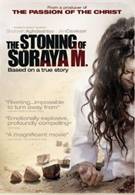I'm occasionally foolish enough to think that I don't take being an American for granted. I complain about things like reality television from a home with central air, often on a full stomach. I claim that policemen are oppressive, but their presence severely lowers the chances that a violent act will befall me. The Stoning of Soraya M. is one of those awesomely depressing dramas whose characters widen the gap for my list of people I would never want to be reincarnated as. Though the dialogue is sparse and to the point, it speaks volumes about humanity's dissonance. The Stoning of Soraya M., based on the nonfiction novel by Freidoune Sahebjam, begins with a long series of dialogue-free location shots and intimate moments with journalist Freidoune (Jim Caviezel) and forlorn Zahra (Shohreh Aghdashloo). I didn't initially understand how glorious these minutes were, both because the cinematography is continually amazing, and because I, the viewer, was the most pleasant-minded I would be during my viewing.
Friedoune, while passing through a remote Iranian village, has car troubles, and is forced to rely on a simpleton mechanic named Hashem, played by famed Iranian writer/director/comedian Parviz Sayyad. He's quickly affronted by the Mullah (Ali Pourtash), the local religious man, and is later called upon by Zahra. She has quite the story to tell. She has to alert Friedoune in secret, and tells her story in English, so as to avoid the ears of eavesdroppers. It soon becomes apparent how critical this secrecy is.
Zahra's niece, Soraya (Mozhan Marnò), loving mother of four, is in a loveless marriage with husband Ali (Navid Negahban), who seeks a divorce so that he can take the "hand" of a much younger woman. Soraya denies him, as she would be left with a less than meager income with which to raise her children. That doesn't really matter to Ali, though, as he'd rather let his fists do the convincing. Things take a brutally ugly turn as false charges are made that bring Soraya's fidelity into question. As it happens in a Simpsons episode, the clueless crowd, including mayor Ebrahim (David Diaan), jumps onto the scandalous bandwagon and seals her fate. I'll refer you to the title of the movie if you think Soraya will be around for a sequel.
Despite sounding like hammy melodrama, this is a sincerely moving film. There are no subplots diverting the story, so nothing can distract you from the inevitable conclusion and the incredulous anguish that it inspires. For much of the movie, I was ashamed to share the same genitalia as most of the men of the village. The flagrant mishandling of women and justice are sickening, even more so when the "God's will" net is draped over all logical thought. That kind of misogynistic thought is why I don't open doors for men, either. (There's a joke in there.)
On a technical level, The Stoning is just as flawless. Aghdashloo is an actress whose career has covered heavy material, and there's a reason she keeps getting hired. The anger and sadness never leave her face, nor her voice. Caviezel, though not onscreen long, does a fine job and is barely recognizable. Marnò, seemingly without having to do much at all, earns all sympathy that the character calls for. It doesn't hurt that she's quite beautiful, as well. The male actors are commendable for portraying things as real as they did, though my bias towards the characters is subconsciously carried over. I could speak at length about how exquisite the camerawork and location shooting is, but it's better to see it than to hear about it. It reminds me of the otherwise incomparable Open Water, in terms of how the locale's remoteness plays as large a role as the human cast.
In all honesty, my tastes in foreign films usually run towards the more action-packed or whimsical, because my attention span warrants some form of relatability in order to process things naturally. This is an awful way to look at things, as many masterpieces have, and will continue to, elude me. I'm proud to say that isn't the case here. The Stoning of Soraya M. should definitely be watched at least once, even if you never make it to a repeat viewing. Beyond my pale descriptions of the harsher plot elements, embedded in this film is a message of love, strength, and true hope that most American dramas water down to nothing. There are two commentaries on this disc, which means that it has to be watched three times in order to get the full experience. That said, it was rewarding to rewatch the beginning of the film after knowing everything that happens. Helping you along on one commentary are director/co-writer Cyrus Nowrasteh and co-writer Betsy Giffen Nowrasteh. It's mostly laugh-free, but has plenty of informative tidbits to keep you entertained, such as the troubles getting clearance to make the movie, as well as finding a cast whose participation would not bring danger to themselves or Iranian family members. It's a bizarre thing to consider. The second, a more technical track with a line producer and costume/set designers, is more light-hearted, while just as detail-packed. I took the costumes and set dressing for granted during my initial viewing, but I now truly appreciate the enormity of their tasks.
There is a single 50-or-so minute behind-the-scenes feature, "The Making of The Stoning of Soraya M.," that's split into the segments Inspiration, Production, and Completion. It's a really well put-together mini-doc that covers all the bases that the commentary discussed, but with more from the cast and crew. There's plenty of footage from the filming, as well as a look at the procedures taken for the film's more violent sequences. Including trailers, the extras on this disc are few, but the quality makes up for it.
Your Daily Blend of Entertainment News

Nick is a Cajun Country native and an Assistant Managing Editor with a focus on TV and features. His humble origin story with CinemaBlend began all the way back in the pre-streaming era, circa 2009, as a freelancing DVD reviewer and TV recapper. Nick leapfrogged over to the small screen to cover more and more television news and interviews, eventually taking over the section for the current era and covering topics like Yellowstone, The Walking Dead and horror. Born in Louisiana and currently living in Texas — Who Dat Nation over America’s Team all day, all night — Nick spent several years in the hospitality industry, and also worked as a 911 operator. If you ever happened to hear his music or read his comics/short stories, you have his sympathy.

